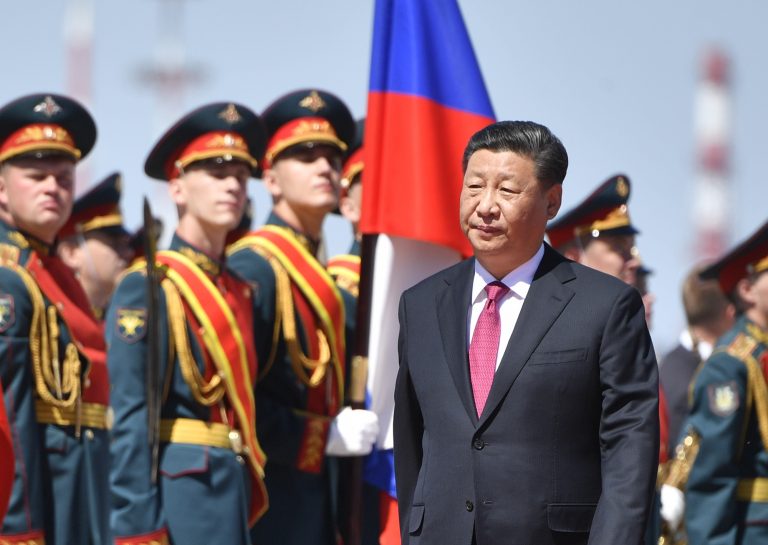According to a recent report by Politico, China is quietly shipping millions of dollars worth of nonlethal, militarily useful equipment to Russia that experts say will have a material impact on Putin’s now 17-month-long “special military operation” in Ukraine.
At the center of the issue is Chinese manufacturer Shanghai H Win, which has seen a surge in orders following Russia’s invasion. Customs records indicate that the company has shipped hundreds of thousands of bulletproof vests and helmets to likely-Russian buyers.
China is skirting sanctions by sending equipment that is designated as “dual-use” technology; equipment that can be used by both civilians and militaries, a distinction that provides exporters enough deniability to avoid scrutiny from the West.
Politico describes it as a “China-sized loophole” that allows China to skirt international sanctions levied against Russia.
In addition, so far this year, Russia has imported over $100 million worth of Chinese drones, 30 times more than what Ukraine has, and shipments of ceramics — a material used for manufacturing body armor — have increased 69 percent, trade worth around $225 million.
Success
You are now signed up for our newsletter
Success
Check your email to complete sign up
In contrast, Ukraine’s imports of ceramics from China has plummeted 61 percent.
Sources told Politico that drones and dual-use goods will not attract the attention of European Union authorities since they are not something that was explicitly agreed upon when sanctions were drafted.
READ MORE:
- Chinese Embassy Says Washington Must Lift Sanctions for Military Talks
- Japan Would Probably Aid Taiwan With Equipment or Logistics, Defense Minister Says
- China Replaces Foreign Minister After Mysterious Absence
Russian shell companies
In some cases, Russia appears to be using shell companies to procure the equipment. One customer of Shanghai H Win, Silva, located in the Buryatia region of Eastern Siberia, appears to be a brand new firm. It was registered in September last year and reported no profits in 2022, yet it placed an order for 100,000 bulletproof vests and helmets.
Two other Russian companies, Legittelekom, which Politico describes as a “freight forwarding company,” and Rika, both made similar orders.
An employee of Legittelekom, when contacted by Politico, refused to say whether or not the company is supplying the Russians, saying, “This is a commercial activity and we do not disclose our commercial activities.”
Politico found more than 220 shipments, worth $11 million, of thermal optics equipment to the Russian company, Rika.
Helena Legarda, an analyst that specializes in Chinese defense and foreign policy at the Mercator Institute for China Studies, told Politico, “What is very clear is that China, for all its claims that it is a neutral actor, is in fact supporting Russia’s positions in this war.”
However, she believes that equipment including thermal imaging technology and body armor, that can be used in an offensive, are not likely to trigger a response from authorities.
“Then there’s this situation that we’re in at the moment — all these dual-use components or equipment and how you handle those,” she said, adding that, “I would not expect the EU to be able to agree to sanctions on that.”
READ MORE:
- US Navy Buzzes Taiwan Strait With Surveillance Aircraft
- Japan Aligns With the US, Imposes Export Controls on Chip Making Equipment to China
- Germany’s ‘Strategy on China’ Marks Beijing as Both Partner and Rival
Mislabeling dual-use items
A common tactic being employed to hide shipments of militarily useful equipment from China is to mislabel the shipments.
According to customs data, shared by ImportGenius, in October and December of 2022, Chinese multinational, SZ DJI Technology Co., Ltd, shipped $60 million-worth of “airsoft helmets” and “miscellaneous ceramics” to Pozitron, a company based in Rostov-on-Don, a port city and the administrative center of Rostov Oblast in Russia.
“Sanctions and defense experts say … that it’s common practice to mislabel dual-use goods as being for civilian purposes when they’re in fact destined for the battlefield,” Politico reported.
Pozitron appears to be a shell company too. According to its financial statements, in 2021 the company recorded a revenue of just 31 million rubles, or around $400,000, however its revenues surged to 20 billion rubles, or almost $300 million in 2022 following Russia’s invasion.
When reached by Politico, Pozitron’s general director, Andrey Vitkovsky said that his company has “never imported drones and similar products from China.”
“The main activity of Pozitron LLC is the purchase and sale of consumer goods, sporting goods, and fabrics, both produced in the Russian Federation and imported from China,” he said, adding that his company’s operations were “exclusively peaceful in nature, in compliance with all rules and restrictions.”
Politico characterized this denial as “typical” as vendors have good reason to hide their operations in order to avoid western sanctions and protect their profits.
Last March, a Russian company, Tekhkrim, was importing Chinese assault rifles while declaring them “hunting rifles.” After investigation the firm was singled out and sanctioned by the United States.

















